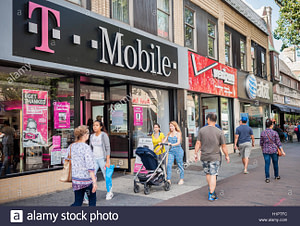
Dear Ms. Smartphone: I was visiting in my hometown and noticed that many mom-and- pop stores were closing. But, there seemed to be a lot of phone stores springing up, both the big guys and small shops that do phone repairs. I never go to these places and I renew my phone contract like once every three years. So why are there so many of them? Raven, New York.
Dear Raven: Labor Day weekend is a great time to ponder this since traditionally there were Main Street parades and Labor Day sales. But, in your hometown, like so many others, things are not the same. It’s not surprising that there’s a phone store now on every corner- along with a pizza joint. Statista estimates there will be 79 billion dollars in U.S. phones sales in 2021 but ‘only’, 46.4 billion dollars in pizza sales.
That said, phone stores are a relatively new concept. Before telco deregulation in the nineteen eighties, you had to lease ‘the instrument’ (a phone) and it was delivered by a technician who hard-wired it to the copper cable network. The Western Union backstory: non-Bell equipment could damage the network.
Grab for Retail Space
With the advancement of fiber optics and wall jacks, consumers could plug in their own phones. But, it was really the growing market for cell service after 2000 that made retail explode. Now, instead of one or two phones per household, each person in the household (kids too!) wanted one.
That was before Internet commerce took off so it began the grab for good retail space. A first-class building and choice location helped build consumer confidence, show and tell the product, and lock-in contracts. Other companies with brand new technology did the same- think Gateway Computer, Dell, and most recently Microsoft. With at least four major carrier telco choices (AT&T/Verizon/TMobile/Sprint) there was a store for each corner and customer.
The small stores you mention- they grew to serve a different need. Even today they are visited if you go month- to- month, pay cash, or need repairs. They often resell access from the major carriers at a reduced cost. And, for many customers, the long-term contracts are complex, so it’s an opportunity to explain them better.
But retailing evolves: In this decade the Gateway and Dell stores have closed. Earlier types of retail outlets, say banks, are downsizing into tiny ATMS, and automobile dealerships are shrinking in number and size. It’s likely that phone stores will go this way, leaving new options for your hometown!
In Store, For How Long?
That said, about 63% of U.S. “full service” phone sales are still made in store, but if you follow this JD Power report, phone and online sales channels experienced their largest year -over- year growth. People who purchase in the phone store first engage in browsing online, using their old phone of course! By the time they visit the phone store they have shopped their new product and mainly want to hold and feel it.
So, expect a growing interplay between digital and downtown. Forrester Research reported two years ago (cited in Forbes) that 53% of all purchase decisions are digitally influenced. Now, because the Covid pandemic forced stores (like Verizon, AT&T, etc. to close) consumers experienced the convenience of online purchasing online. Forrester now predicts that online shopping will grow to 27% of overall retail sales by 2023, from around ~18 percent today.
As a result of shopping online, in-store shoppers have different expectations: they want detailed product information, ratings and reviews, and access to the best price. In some markets you now need a phone to enter the store, and in other outlets, like an Amazon store, using the phone brings you the best specials and check out. Unless the retail phone stores adapt, say to offer more in-person instruction like Apple does, and give choices for the sustainable recycling of trade-in phones, and present a more personalized experience, like Nike, it’s hard to imagine that they will thrive. Happy Labor Day as we figure out this next economy!


Leave a Reply
You must be logged in to post a comment.